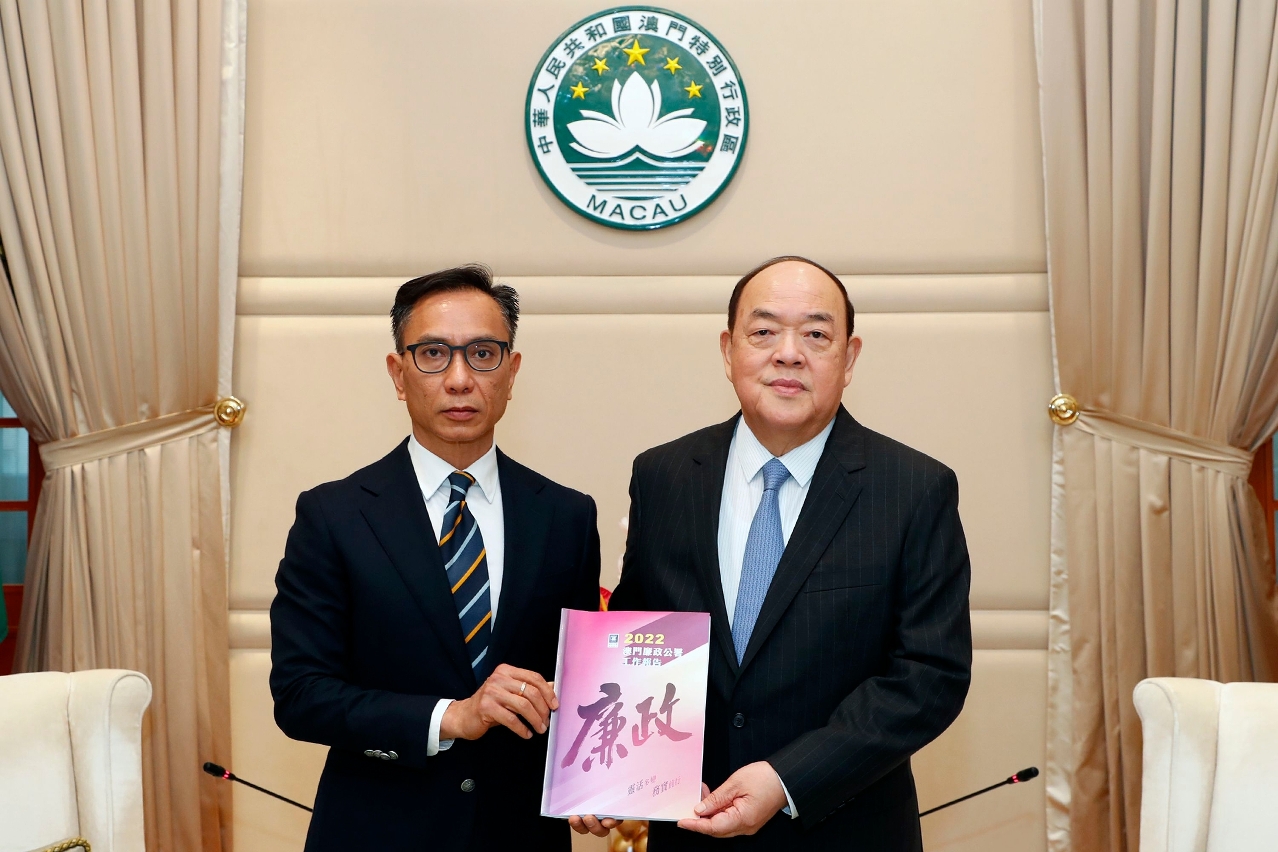 The Commissioner Against Corruption, Chan Tsz King, submitting the 2022 Annual Report of the CCAC of Macao to the Chief Executive, Ho Iat Seng.
The Commissioner Against Corruption, Chan Tsz King, submitting the 2022 Annual Report of the CCAC of Macao to the Chief Executive, Ho Iat Seng.
The 2022 Annual Report of the Commission Against Corruption of Macao has been published in the Official Gazette of the Macao Special Administrative Region today (16th June). According to the report, the CCAC performed its duties pragmatically in 2022. In face of the challenge of severe epidemic, it sustained its efforts to carry out its duties diligently, dedicatedly and closely integrate the work of suppression, regularisation and guidance with a view to promoting various governance work firmly.
Throughout the year, there were a total of 678 complaints and reports, etc. Following consolidation of complaints or reports according to the subject matter, the CCAC put a total of 274 cases on file, including 103 cases followed up by the Anti-Corruption Bureau and 171 cases followed up by the Ombudsman Bureau. There were 322 cases which did not meet the conditions to be placed on file and were thus archived or transferred to competent departments for follow-up.
In the anti-corruption area, the CCAC detected an electoral bribery case involving more than 200 voters and a case of the crime of breach of secrecy involving a private company last year. It also carried out in-depth investigations of some cases related to subsidies granted by the Government. These show that the CCAC spares no effort in safeguarding the public interest of the Macao SAR. There was an increase in the number of cases related to illegitimate access to computer data by public servants. In the opinion of the CCAC, the Government should improve the relevant system so as to ensure the security of public data and personal information. Last year, the CCAC, for the first time, received a case involving the surrender of a suspect and a case where Macao and Hong Kong, for the first time, made a successful cross-jurisdictional effort in jointly fighting corruption through overcoming the situation that the two places have different legal requirements on corruption offences in the private sector. According to the CCAC, despite that it has cooperation with the Chinese mainland and Hong Kong concerning mutual case assistance, it still hopes that judicial assistance in criminal matters can be established between Macao and the Chinese mainland and between Macao and Hong Kong so that inter-regional cooperation in criminal matters can be carried out according to law. The CCAC also found that some complainants made dozens of complaints against certain targets in a short period of time. There were also complainants resorting to the form of false accusation to vent their personal anger, which, according to the CCAC, may lead to themselves being criminally responsible. The CCAC therefore urges the public to file complaints or reports in a rational and responsible manner.
As regards ombudsman actions, the CCAC received many complaints from residents over various epidemic prevention measures adopted by health departments as well as enquiries and complaints regarding matters related to compensation and allowance from personnel of public departments. For the situations occurring in this special period, the CCAC handled them together and exchanged opinions with the competent bodies or departments through meetings. Last year the CCAC also found that some public servants’ awareness of observance of specific duties of public service personnel, such as the principle of exclusivity and the duty of recusal, seemed rather weak. Those who involved in all cases substantiated by investigation have already been subject to disciplinary sanctions by the respective departments. Moreover, in addition to the success in fighting for subsidy for a resident and protection of disabled people’s rights, the CCAC also successively completed the comprehensive investigation report on serious wall tile falling at common areas of Edifício do Lago and Edifício Ip Heng, the comprehensive investigation report on unlawful occupation of state owned land, the inquiry report on the intelligent terminal system for taxis and the inquiry report on cultural heritage protection work for Lok Kok Restaurant. Through intervention into the matters that widely concern the public, the CCAC co-operates with competent entities and departments to seek solutions, safeguard residents’ legitimate rights and interests and streamline administration work. Meanwhile, the CCAC continues to make good use of the “retrospective review” mechanism to continuously follow up the improvement and optimisation actions taken by relevant departments or entities. In addition, the CCAC has concluded many cases about delay in vetting and approval of renewals or applications of the right of abode by the Macao Trade and Investment Promotion Institute. Following the investigations, the CCAC considered that since the number of cases involving the relevant problems that the competent authority needed to review reached one thousand and it is gradually completing the relevant vetting and approval processes and the respective reports, in general no situation involving administrative omission was seen.
Moreover, following the online appointment service for declaration of assets and interests, the CCAC continuously improved the progress enquiry service of online complaint such that complainants or reporters could know or respond to the messages of the CCAC. In addition, the online booking service for lodging a complaint was also rolled out. According to statistics, 79 appointments were made through the system in 2022 and the complainants showed up for 69 of them. The CCAC hopes that residents may make more use of the appointment system in order to reduce the waiting time for them.
In the area of promotion and education, the CCAC renovated the Branch Office in Taipa where it was slated as an integrity education base mainly targeting at young people and civic associations. Due to the trend of online learning in recent years, various online learning resources were rolled out, including more online projects that were launched through cooperation with civic associations. Since Macao was still affected by the novel coronavirus pandemic last year, the CCAC was unable to send delegates to attend international or regional meetings in person. However, it still kept on virtually attending various meetings, conferences, workshops, training courses, etc.
The Annual Report has been submitted to the Chief Executive, Ho Iat Seng, in accordance with the Organic Law of the Commission Against Corruption of the Macao Special Administrative Region. Summaries of some of the cases handled by the Anti-Corruption Bureau and the Ombudsman Bureau were included. The full text of the Annual Report can be downloaded from the CCAC’s website.


